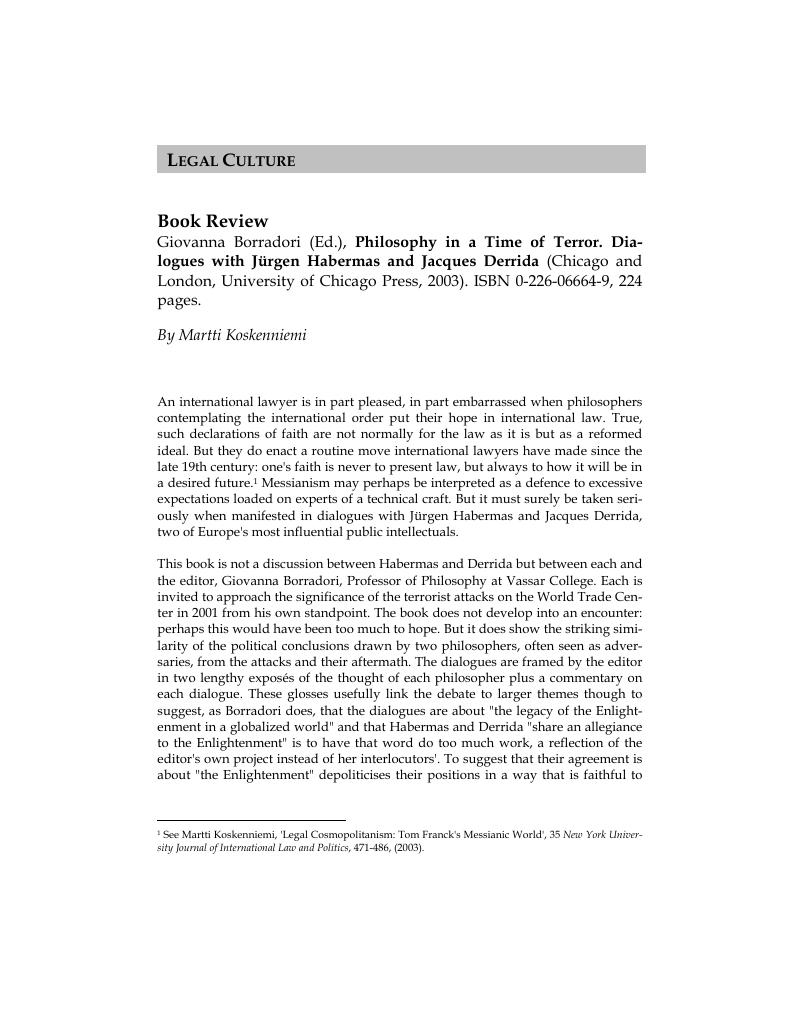Published online by Cambridge University Press: 06 March 2019

1 See Koskenniemi, Martti, ‘Legal Cosmopolitanism: Tom Franck's Messianic World', 35 New York University Journal of International Law and Politics, 471-486, (2003).Google Scholar
2 The views of Habermas on the nature of the conflict between the morally inspired hegemonic unilateralism of the United States and the pluralistic universalism of (Kantian) international law is laid out with great clarity and force in his ‘Interpreting the fall of a Monument', 4 German Law Journal, 701-8 (2003), available at: http://www.germanlawjournal.com/pdf/Vol04No07/PDF_Vol_04_No_07_701-708_European_Habermas.pdf, or at: http://www.germanlawjournal.com, search author: Habermas. The article was originally published in German in the Frankfurter Allgemeine Zeitung on 17 April 2003.Google Scholar
3 Here would be a representative view: “[C]'est la véritable victoire du terrorisme que d'avoir plongé tout l'occident dans l'obsession sécuritaire, c'est à dire dans une forme voilée du terreur perpetuelle”, Jean Baudrillard, Power Inferno. Requiem pour les Twin Towers. Hypothèses sur le terrorisme. La violence du mondial (Galilée, 2003), 59.Google Scholar
4 Earlier, Habermas had accepted Schmitt's critique as it concerned the unmediated moralisation of politics and offered against this what he calls the “decisive moment” of mediation by “an authority that judges impartially and fulfills the conditions of neutral criminal punishment”, ‘Kant's Idea of Perpetual Peace with the Benefit of Two Hundred Years’ Hindshight', in James Bohman and Matthias Lutz-Bachmann, Perpetual Peace. Essays on Kant's Cosmopolitan Ideal (MIT Press, 1997), 147. Habermas is surely right when he observes that drawing attention to the danger of moralisation provides no reason to discard attempts towards institutional regulation. Whether today's multilateral institutions effectively exemplify such authority, may however be debated.Google Scholar
5 I have tried to articulate something like this as part of international law's political project in Martti Koskenniemi, ‘What is International Law For?', in Malcolm Evans (ed,), International Law (Oxford University Press, 2003), 105-111.Google Scholar
6 Anne Orford, Reading Humanitarian Intervention. Human Rights and the Use of Force in International Law (Cambridge University Press, 2003).Google Scholar
7 The opposition between the radical break of “l'événement” to the bourgeois tranquillity of “l'ětre” which derives from Heidegger is a much-debated theme of recent continental philosophy. See e.g. Alain Badieu, L'ětre et l'événement (Paris, Seuil, 1988). See also the book review, Martti Koskenniemi, Alain Badiou D'Un désastre obscur: sur la fin de la verité de l'ètat (1998) and Ethics: An Essay on the Understanding of Evil (2001), XI Finnish Yearbook of International Law, 430-442(2000).Google Scholar
8 Likewise, Baudrillard, supra note 3, 14-18, 38.Google Scholar
9 Baudrillard suggests that an event can be an event only outside discourse and that it ceases to be one when captured by discourse, supra note 3, 21-5, 35. As discourse gives meaning, an “event” (in the heavy, Heideggerian sense also employed by Badiou) can only be meaningless. Derrida does not go that far. The event may be represented in discourse, even if it may be only revealed in deconstruction, through a glimpse at the “trace” it has left on the conceptual surface.Google Scholar
10 Roberto Unger, False Necessity. Anti-Necessitarian Social Theory in the Service of Radical Democracy (Cambridge University Press, 1987).Google Scholar
11 Europe's role as the “vanishing mediator” or the translator between the US and the East, itself transforming in the course of such mediation, is interestingly discussed in Étienne Balibar, L'Europe, l'Amerique, la guerre (Découverte, 2003), 35-61.Google Scholar
12 Jacques Derrida, ‘Force of Law: The Mystical Foundation of Authority', in Drucilla Cornell, Michael Rosenfeld, David Gray Carlson, Deconstruction and the Possibility of Justice (Routledge, 1992), esp. 3–29.Google Scholar